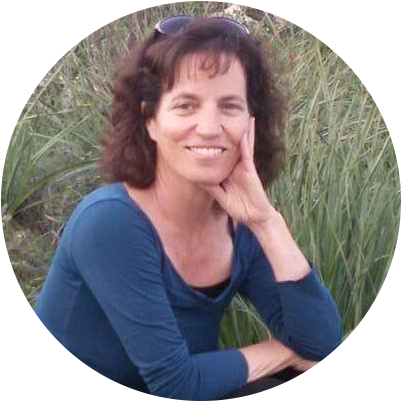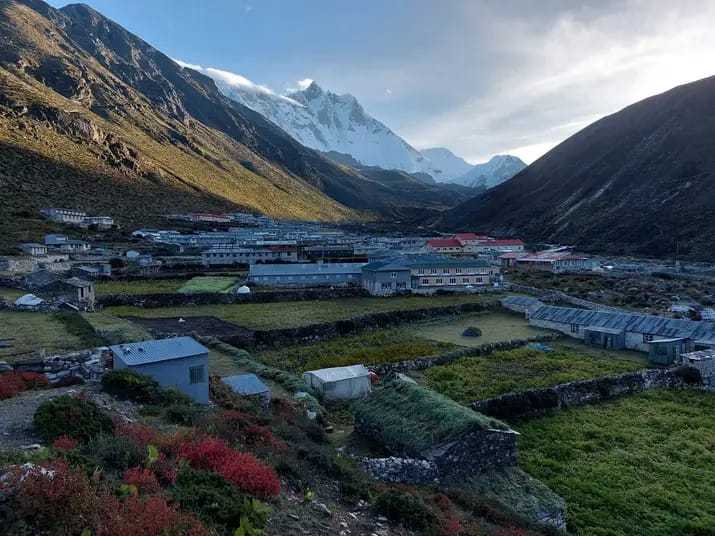The best time for the Everest Base Camp Trek
Spring Trekking in the Everest Region:
- Breathtaking Views: Spring offers stunning views of ice-capped mountains, vibrant hills, and expansive Himalayan pastures.
- Blooming Flora: Rhododendrons and other spring flowers bloom in lower areas, adding to the beauty of the landscape.
- Snow-Covered Mountains: The aftermath of winter snowfall leaves snow-covered mountain ranges above Namche Bazaar, providing endless picturesque views.
- Ideal Weather: Days are sunny, warm, and bright, with longer daylight hours, creating optimal conditions for trekking.
Autumn Trekking in the Everest Region:
- Clear Blue Skies: Autumn brings clear blue skies and bright, sunny days, offering excellent visibility and stunning views.
- Lush Greenery: Hills become lush and green after the monsoon rains, while mountains showcase their best features.
- Moderate Temperatures: Daytime temperatures hover around 20 degrees Celsius, with nighttime temperatures dropping to around 5 degrees Celsius below 3500 metres altitude. Higher altitudes experience colder nights, with daytime temperatures reaching around 20 °C and nights dropping below freezing.
Off Season:
Trekking in Nepal and Everest Base Camp during off-seasons is also quite common. The weather in the off-season presents a number of difficulties, too. Wintertime problems might also arise from extremely cold temperatures and a lot of snow. Therefore, with thoughtful preparation, it is possible to deal with this off-season weather.
Permits are required for the Everest High Pass Trek.
The Everest High Passes Trek requires the following permits:
- Khumbu Pasang Lhamu Rural Municipality Permit: This permit costs US$20 and is required for all trekkers entering the Khumbu region, which includes the Everest Base Camp trek.
- Sagarmatha National Park Permit: This permit costs US$30 and is required for all visitors entering Sagarmatha National Park, which encompasses the Everest Base Camp trek.
Red Rose Travels will obtain all the necessary permits on your behalf for a hassle-free trekking experience.
Food and Accommodations
Food: The way of life in the Himalayas is distinct and challenging, and the cuisine is likewise diverse. There will be many tea places along the Everest Base Camp Trek that serve both vegetarian and non-vegetarian food. From hot and comforting thukpa and other regional specialties to, in certain locations, foreign cuisine as well,.
Accommodations: The accommodations at Tea Hoses on the mountain are extremely basic. The rooms usually have just two or three single beds, warm blankets, pillows, cosy matrices with connected bathrooms (but not always), and pleasant views. We will also make sure you are accommodated in the best tea houses with stunning views of the surrounding landscape and mountains during your journey.
Physical fitness is required for the Everest Base Camp Trek.
Because of its challenging difficulty level, this trip requires a high level of physical fitness. Injuries or illness could be fatal, and you are walking more than other Everest Base Camp Trek routes, so please assess your level of fitness before planning for this trek.
Assess your fitness:
It is recommended to work out on a regular basis (running, swimming, or at the gym) for at least half an hour in order to get ready for the trip. At least 30 days before the trek, try to walk at a moderate speed for 30 to 45 minutes at a time. This will not only increase your cardiovascular endurance but also your overall fitness. Your stability and endurance can also be improved by strengthening your back, legs, and core through exercises or stair climbing, particularly on uneven terrain.
If you're not currently meeting these criteria, don't worry! You can still prepare for the trek with a consistent training programme.
- Start with shorter walks and gradually increase the duration and intensity as your fitness improves.
- Incorporate uphill sections into your walks or use a stairmaster to simulate the trek's terrain.
- Focus on strengthening exercises like squats, lunges, planks, and core exercises.
- Listen to your body, don't push yourself too hard, take rest days when needed, and consult a doctor if you have any concerns.







